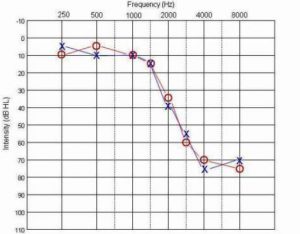A
variety of tests* can be done to identify and diagnose hearing
loss. The method used depends in part on the age of the
individual along with other factors based on specific needs. If
you’ve had your hearing checked at an audiologist’s office,
you’ve probably received more than one type of test. Here are some
of the main types of hearing tests, what they measure and what you
can expect if you’re getting one.
Standard
Hearing Screening, also known as Pure-Tone Testing – This hearing
test determines the faintest tones a person can hear at selected
pitches, or frequencies, from low to high. During this test, earplugs
or earphones are worn, so that information can be obtained for each
ear. The person taking the test will then be asked to respond when
they hear a sound. The audiologist may have you respond to the sound
in a variety of ways, such as raising a finger or hand, pressing a
button, or saying “yes” to indicate that a sound was heard. The
sounds played are at different pitches and levels. The results will
be recorded on an audiogram.
Speech
Testing – This is an aspect of the standard exam where speech
discrimination or word recognition is tested. This helps confirm the
pure-tone test results and it helps audiologists assess how well a
hearing aid can help. The test involves word recognition and
repeating words at a comfortable loudness level. It’s also recorded
on the audiogram.
Middle
Ear Testing – This provides information on how the middle ear is
functioning. These measurements include tympanometry (putting air
pressure into the ear canal to measure the mobility of the eardrum).
This test helps detect fluid, perforation of the eardrum or a wax
blockage.
Auditory
Brainstem Response (ABR) Testing – This test measures how long it
takes sound to get from your ear to the processing areas in your
brain. This can reveal if the pathways between the brain and the
inner ear are working correctly. An ABR test is performed by placing
small electrodes on the head and recording brain wave activity in
response to sound. The person being tested is either quietly resting
or asleep. A computer averages the information for the audiologist to
interpret.
Otoacoustic
Emissions Testing – Otoacoustic Emissions (OAEs) are sounds given
off by the inner ear when the cochlea is stimulated by a sound. When
sound stimulates the cochlea, the outer hair cells vibrate. The
vibration produces a nearly inaudible sound that echoes back into the
outer ear. This sound can be measured by a small probe inserted in
the ear canal.
If
you believe you suffer from hearing loss, there are multiple tests
that can help you find out and get you on the track to better hearing
and better health! Please call Evolution Hearing in Charlottesville,
VA at 434-260-8007 or at our Raleigh, NC
location at 919-670-3258 today to see
how we can help.
Content
Source Types
of Hearing Tests






